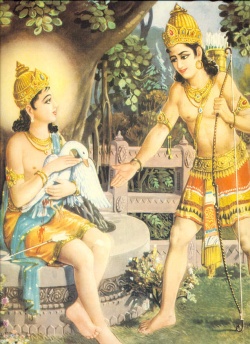Bimbisara
BIMBISARA :Bimbisara 婆娑羅王 (Skt, Pali; Jpn Bimbashara-o) was the king of Magadha with the capital at Rajgir.
“King of Magadha at the time of the Buddha; built the city of Rajagrha (Bihar/India). He converted to Buddhism and presented the Bamboo Grove to the Buddha for the use of the Sangha. He was murdered by his son Ajatasatru.” Bimbisara in his past life was also a
king. One day, traveling through the Vipula Mountains on a deer hunt, he found himself sadly without a catch. In meeting up with an
ascetic, the king decided to chase him on horseback, and in the end he ordered him killed. The ascetic as he was about to die made a malevolent vow, ‘I vow to return in my next life and just as you have destroyed me today, I shall mentally and verbally destroy you.’ ”
The ascetic is said to have been reborn as Ajatasatru, the King’s only son and heir to the throne. Tana: 136
There is another more poetic version of this story (see “Ajatasatru”). Both accounts however make the point of Ajatasatru being unjustly killed in his previous incarnation by his present father King Bimbisara. The story of King Bimbisara and Ajatasatru appears at the beginning of the Meditation Sutra, a key Pure Land text.
He was the greatest patron of Gotama Buddha.
He became the king at the age of fifteen and reigned for fifty-two years until he abdicated the throne in favor of his son Ajatasattu (Sanskritised: Ajatashatru).
His wife was a princess of Kosala, a sister of the king Pasenadi, who gave birth to Ajatasattu.
He had other wives and co-wives, viz., Khema, Silava and Jayasena.
He also had a son by the famous courtesan Ambapali, who was given the name Vimala Kondanna.
According to the Pabbaja Sutta of the Sutta Nipata Atthakatha it is stated that he fist saw the Ascetic Gotama through his palace window under the Pandava Pabbata and followed him and invited him to visit his court.
But when Gotama turned down the invitation he wished him luck in his quest and re-extended the invitation to visit Rajgir no sooner than he achieved Enlightenment.
It was in fulfilment of that promise that The Buddha had visited Rajgir after converting the Tebhatika Jatila.
When The Buddha and his Monks visited Rajgir as royal guests and finished the royal meals, Bimbisara then poured some water from a golden jar on The Buddha’s hands to express the solemnity of his pledge to donate Veluvana Park to him and his Monks.
Furthermore, Bimbisara continued to patronise the growth of Buddhism for another thirty-seven years.
Bimbisara’s end was extremely tragic.
Despite the warnings given by the soothsayers that his son Ajatasattu’s birth was inauspicious for him, yet he reared him with great care and affection.
When Ajatasattu came of age he plotted to kill his own father under the influence of Devadatta, who loathed the king’s patronage to The Buddha, which had further undermined his recognition.
When the plot was discovered; and the father read the intense urge of his son to become the monarch he abdicated the throne in his favour.
But when instigated again by Devadatta the new monarch got him arrested.
As Bimbisara was not supposed to die except by starvation, so he was imprisoned in a heated prison house, where he was made to starve.
No visitor was allowed to enter there except for Khema, his mother.
First, she carried Food in a golden bowl concealed in her dress.
When that was discovered she carried Food concealed in her foot-gear.
When that, too, was discovered she carried Food concealed in her head-dress (moli).
When all these were discovered then the queen mother visited the old man after bathing in scented water and smearing Honey in her Body for the old king to lick and survive.
When this, too, was detected her entry was finally banned.
Nonetheless, Bimbisara survived by meditating-while-walking.
When the son learnt that his father was not to die easily he sent some barbers inside the prison.
Bimbisara Thought that his son had relented and had, at last, realised his Guilt; so, he had sent the barbers to shave his beard and cut his Hair to help him lead the Life of a Monk.
But no! Those barbers were sent to cut open his feet and to fill the wounds with salt and vinegar and then to burn the wounds with coal.
Thus prevented from meditating-while-walking he met his tragic end.
See Dhammapada Atthakatha i.233.
